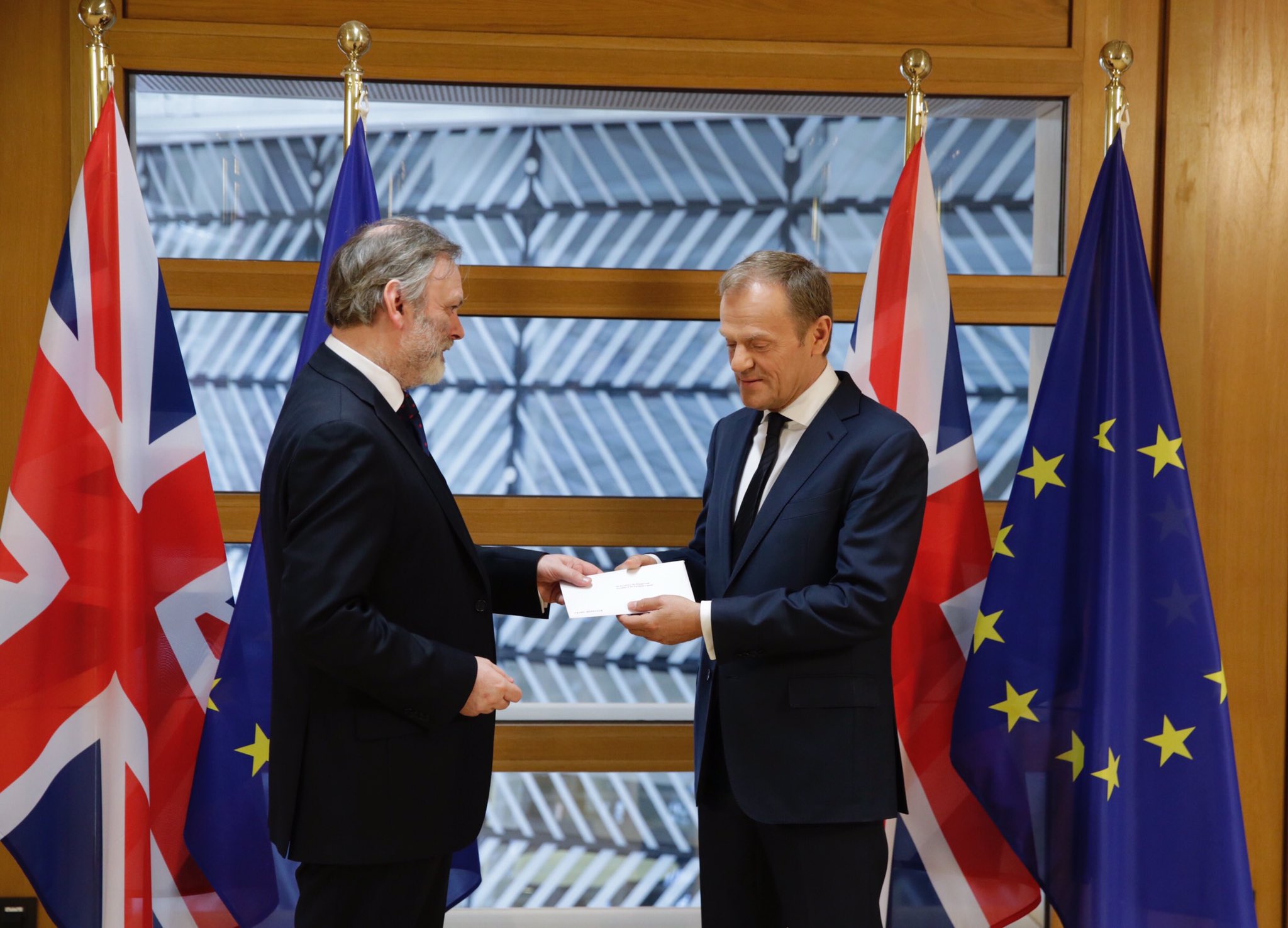Brexecution Underway: UK Notifies EU of Intent to Depart
It’s official: as of today, the Government of the United Kingdom has notified the European Union of its departure.
In preparation for the Brexecution, let’s outline the salient events since our last update and describe the legal and political considerations that will follow the notification.

Published by The Lawfare Institute
in Cooperation With

It’s official: as of today, the Government of the United Kingdom has notified the European Union of its departure.
In preparation for the Brexecution, let’s outline the salient events since our last update and describe the legal and political considerations that will follow the notification.
Recall that the U.K. Supreme Court decided that the Government would have to seek the assent of Parliament to invoke Article 50 of the Treaty of the European Union, the provision that dictates the process of withdrawal from the EU. Immediately after the Supreme Court decision, Prime Minister May’s Government proposed the two-line EU Notification of Withdrawal Act 2017 (“The Brexit Bill”) that authorizes the Prime Minister to notify the EU of the United Kingdom’s withdrawal. The Brexit Bill passed the House of Commons but the House of Lords made amendments to ensure the status of EU residents within the U.K. and to require that the Parliament would have a “meaningful vote” over the final Brexit agreement. When the Brexit Bill went back to the Commons, MPs overturned these amendments and the House of Lords declined to reinsert them in the second round of review. Thus, the Brexit Bill passed Parliament to receive Royal Assent on March 16.
The day after the House of Commons’ first vote on the Brexit Bill, David Davis, the Secretary of State for Exiting the European Union, presented a seventy-seven page white paper detailing the government’s negotiating objectives: regaining sovereignty by ending the applicability of EU laws and European Court of Justice jurisdiction; maintaining harmony inside the U.K. and among the devolved administrations of Scotland, Northern Ireland and Wales; retaining a “seamless and frictionless” border with the Republic of Ireland while also “protecting the integrity of the U.K.’s immigration system”; negotiating reciprocal rights for U.K. and EU nationals living in the territory of the other; controlling immigration into the U.K.; negotiating a free trade agreement and a customs agreement with the EU; and, maintaining commitments to European security, law enforcement and anti-terrorism programs such as Europol, the European arrest warrant, the Schengen information system, the EU passenger name records and the European criminal records information system.
Despite its length, the paper didn’t reveal many new negotiating points but there were some admissions of note: the government may be open to a phased process of implementation for immigration limitations and continuing to make “appropriate” contributions to the EU budget for programs in which the U.K. may want to participate.
So, what should we expect to happen today? Prime Minister May signed the Article 50 letter yesterday and sent it on its way to Brussels. The official notification took place at 1:30 p.m. Brussels time when the British Ambassador to the EU, Sir Tim Barrow, handed Prime Minister May’s letter of withdrawal to the European Council President, Donald Tusk. At that moment, the two-year countdown for negotiations began.
Fortunately for all parties involved, there was no other switch flipped at the moment of notification. The U.K. remains part of the EU until the end of negotiations or the end of the two-year time limit. Additionally, the U.K. Government has indicated that those arriving in the U.K. from the EU will not be deprived of any rights until the negotiations are complete. Furthermore, the highly anticipated Great Repeal Bill, a bill repealing the European Communities Act and transferring many EU laws into domestic U.K. law, is expected to be published tomorrow.
In an earlier Brexecution piece, I described the layers of negotiations that would have to happen after the invocation of Article 50. To briefly recap: the U.K. and EU negotiation teams will likely negotiate two buckets of agreements. First, they will look to the terms of the British withdrawal in the same way that a couple might look to disentangle their assets, determine ownership and agree on alimony before a divorce. Second, the negotiators will look to determining the U.K.’s future relationship with the EU. Both agreements will involve complex negotiations across all sectors of the economy and politics, from trade to human rights. In this second bucket of terms, the U.K. finds itself at a distinct disadvantage. Throughout the development of deals with the EU, the U.K. will technically be an EU member state, and therefore unable to negotiate any separate deals with third parties that fall under exclusive EU competence, even those as necessary as free trade agreements. Several news sources, including Bloomberg and the Financial Times, report that an EU priority immediately following notification is to secure a commitment from the U.K. to pay its European Union bill, a bill which the European Commission estimates to be around € 60 billion or $65 billion.
But it would be irresponsible for me to suggest that the U.K. and the EU can get straight to substance. Before either of these negotiations begin, there will need to be negotiations about the negotiations in which the teams determine what is negotiated, when and between whom. At least one conflict is already anticipated: the EU would like to negotiate the divorce agreement and the trade deal at separate times, while the U.K. would prefer they be negotiated simultaneously.
Despite the sabre rattling of the last nine months and the decision to pursue a “hard Brexit,” a report from Downing Street characterizes separate telephone calls between Prime Minister May and Angela Merkel, Jean-Claude Juncker, and Donald Tusk as punctuated by agreement “that a strong EU was in everyone’s interests and that the UK would remain a close and committed ally.” Additionally, some European diplomats have reported that May’s Government is stepping back from her January threat (“no deal is better than a bad deal”) to leave the EU even if a treaty isn’t finalized. The reality of impending negotiations seems to have fomented pragmatic moderation, especially with respect to the implausibility of completing free trade negotiations in the span of two years. Prime Minister May’s government has seemed more amenable to transitional deals in recent weeks.
Setting negotiation stances aside, is the U.K. Government ready to Brexecute? The negotiation flying formation will be piloted by the three central players: David Davis, Brexit Secretary; Olly Robbins, Mr. Davis’ permanent secretary; and Sir Tim Barrow, the UK Permanent Representative to the EU. Underneath them, 1,000 new jobs have been created to handle Brexit and the Department for Exiting the EU and the Foreign Office have been given £400 million in additional funding for the next four years. But the National Audit Office has reported that one third of those new jobs have been filled and the Institute for Government notes that other departments, such as the Home Office and the Department for Environment, Food and Rural Affairs will be underfunded and required to abandon non-Brexit initiatives.
What might we have to look forward to on the national security front? Government officials report that Prime Minister May used the Article 50 notification letter to propose measures to strengthen security cooperation with the EU government. There is little doubt that the uncertainty of the next two years will create some domestic instability for the states involved. The cross-party Justice Committee in Parliament has implored the government to ensure continued security cooperation with the EU, especially after EU Commissioner Sir Julian King warned that a hard Brexit that curtailed cooperation would encourage networks of cyber-criminals, terrorists, and hostile states. All signs, including Prime Minister May’s January speech and the subsequent February white paper, point to the Government’s continuing the status-quo cooperation between law enforcement and security agencies with an eye toward prioritizing cooperation in any ensuing Brexit agreements. In fact, recent events such as the UK cognate to the U.S. laptop ban and the Westminster attack, may suggest a heightened prioritization of national security measures despite the potential to use national security cooperation as a bargaining chip in other negotiations.
The importance of today’s action lies in its unprecedented nature: the United Kingdom will be the first country to invoke Article 50 and begin the formal process of withdrawal from the EU. But the dynamics of the ensuing negotiations—though not the contents of those negotiations—are largely known, and the process of withdrawal mandates that the United Kingdom remains a part of the EU until the Brexit agreements are completed. So there are reasonable arguments to be made that the passing of Prime Minister May’s letter to Donald Tusk will both change everything and change nothing at all.





